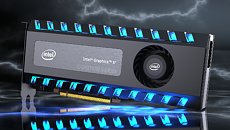Monday, February 18th 2019

Intel Acquires Indian Startup to Strengthen Position in Discrete GPU Tech
Several years ago, Ineda, a small startup from Hyderabad, India made headlines when they developed custom-design processors for use in wearable devices that were optimized for high energy-efficiency, while still having the ability to read out various sensors or listen to voice commands at the same time. Such improvements help increase battery life on devices that people don't want to recharge every day. Over the years the company has received several million dollars in funding from Samsung, Qualcomm, Imagination Technologies and others.
Looks like this caused enough attention at chip giant Intel, who's trying to come up with a competitive design for a discrete graphics processor, that's able to take on AMD's and NVIDIA's offerings. While Ineda certainly has patents that could come in useful, it looks like Intel is more interested in the company's manpower. With around 100 engineers, the company has a lot of talent, that's experienced in chip design and how to make these chips energy efficient.Besides the obvious implications for mobiles devices, energy efficiency is the #1 constraint these days when it comes to graphics performance, since power generates heat, which requires bigger and more expensive heatsinks, and drives up fan noise levels. NVIDIA learned this after GTX 480, and has since made constant improvements in this sector, which is the foundation for their market dominance today.
Ineda Systems founder Dasaradha Gude used to be managing director of AMD India, which suggests some ties with Raja Koduri, who used to be head at AMD's Radeon Graphics department and moved to Intel not long ago, to start up their discrete GPU project. This makes us speculate that Raja, who's also from Hyderabad originally, was instrumental in making this buy-out happen.
Times of India reached out to Intel, which confirmed the all-cash purchase of Ineda, but didn't provide many additional details:
Source:
Times of India
Looks like this caused enough attention at chip giant Intel, who's trying to come up with a competitive design for a discrete graphics processor, that's able to take on AMD's and NVIDIA's offerings. While Ineda certainly has patents that could come in useful, it looks like Intel is more interested in the company's manpower. With around 100 engineers, the company has a lot of talent, that's experienced in chip design and how to make these chips energy efficient.Besides the obvious implications for mobiles devices, energy efficiency is the #1 constraint these days when it comes to graphics performance, since power generates heat, which requires bigger and more expensive heatsinks, and drives up fan noise levels. NVIDIA learned this after GTX 480, and has since made constant improvements in this sector, which is the foundation for their market dominance today.
Ineda Systems founder Dasaradha Gude used to be managing director of AMD India, which suggests some ties with Raja Koduri, who used to be head at AMD's Radeon Graphics department and moved to Intel not long ago, to start up their discrete GPU project. This makes us speculate that Raja, who's also from Hyderabad originally, was instrumental in making this buy-out happen.
Times of India reached out to Intel, which confirmed the all-cash purchase of Ineda, but didn't provide many additional details:
Intel acquired engineering resources from Ineda Systems, a silicon and platform services provider based in Hyderabad. This transaction provides Intel with an experienced SOC (system on chip) team to help build a world-class discrete GPU businessIntel has a lot of software development staff in Hyderabad, and is looking to expand that to several thousand engineers in the coming years. This is good news for the engineers, as they won't have to move, and it helps keep cost down because no relocations are needed.

36 Comments on Intel Acquires Indian Startup to Strengthen Position in Discrete GPU Tech
Player 3 has entered the game
they are trying to catch the GPU train but it is too late for them. even if they release an expensive FPGA at a loss, it will be a huge problem for them to solve.
I bet ARM could throw a football clear over those mountains. Like Uncle Rico. Just needs the chance. Man, if Intel didn't stop every other architecture from sucking at real world work, we could get things done!!!
there are tons of hardware coming with extended battery life and very good connectivity.
But tell me how Intel and AMD can even sell a single CPU in the face of the monster of cell phones and cheap tablets for kids?
Tablets are fine for surfing, email, videos etc but not so great for large Excel spreadsheets for one thing so I don't see Intel or AMD having any trouble selling CPUs any time in the near future.
Just don't go that way. Sure ARM has evolved a lot but still it can do what it can do.
We're dedicated ourselves to run our applications on AARCH64 platform and we don't need x86_64 anymore. Because what we can do at a 30W power budget at a $1200 system is far more superior in the means of "realtime" processing compared to any PC on the planet.Not comparing the two. you are so focused on using the hardware available to you, you stopped thinking about any other possiblity.
en.wikipedia.org/wiki/Tesla_Autopilot#Hardware_2
follow the white rabbit;
elinux.org/Jetson_TX1
elinux.org/Jetson_TX2
elinux.org/Jetson_AGX_Xavier
I'm sure of one thing, you common-computer-fanboys won't understand what I'm talking about.
hackaday.com/2015/11/24/the-nvidia-jetson-tx1-its-not-for-everybody-but-it-is-very-cool/
hackaday.com/2017/03/14/hands-on-nvidia-jetson-tx2-fast-processing-for-embedded-devices/
a few of our examples include, firewalls, routers, signal generators, software-defined-radios, multiple audio video stream capture & upload hardware, single or multiple 4K capture hardware, VR systems.. and yeah, of course, autonomous cars.